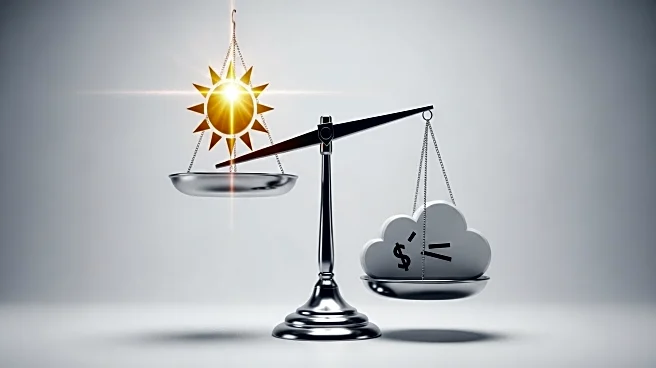What's Happening?
A recent survey conducted by JPMorgan has highlighted a significant disparity in economic confidence between high-income and low-income earners in the United States. The survey results, analyzed by consumer analyst Matthew Boss, indicate that the U.S. economy is experiencing a 'K-shape' recovery, where economic experiences diverge based on income levels. High-income consumers reported stronger economic confidence, with an average rating of 6.2 out of 10, while low-income consumers rated their confidence at 4.4. This 30-point delta underscores the differing financial outlooks between these groups. Additionally, high-income respondents are more optimistic about covering monthly bills and plan to increase spending on non-essential items, unlike their lower-income counterparts.
Why It's Important?
The disparity in economic confidence between income groups has significant implications for U.S. economic policy and consumer behavior. High-income earners' optimism may lead to increased spending, potentially driving economic growth. However, the struggles faced by low-income earners, exacerbated by inflationary pressures, could lead to reduced consumer spending and increased financial insecurity. This bifurcation may influence policymakers to consider targeted interventions to support lower-income groups, ensuring a more equitable economic recovery. The differing confidence levels also reflect broader societal inequalities, which could impact social cohesion and political dynamics.
What's Next?
As the economic disparity persists, policymakers and economists may focus on strategies to bridge the gap between income groups. Potential measures could include tax reforms, increased access to affordable housing, and enhanced social safety nets. Businesses might also adjust their strategies, targeting products and services to cater to the differing needs and spending capacities of these groups. The ongoing analysis of consumer sentiment will likely continue to inform economic forecasts and policy decisions, aiming to foster a more inclusive economic environment.
Beyond the Headlines
The economic confidence disparity highlights deeper societal issues, such as income inequality and access to opportunities. This divergence may lead to increased advocacy for systemic changes, including education reform and workforce development programs. The long-term implications could involve shifts in consumer behavior, with high-income earners driving luxury markets while low-income groups prioritize essential goods. The cultural and ethical dimensions of this disparity may also spark discussions on corporate responsibility and the role of businesses in promoting economic equity.








